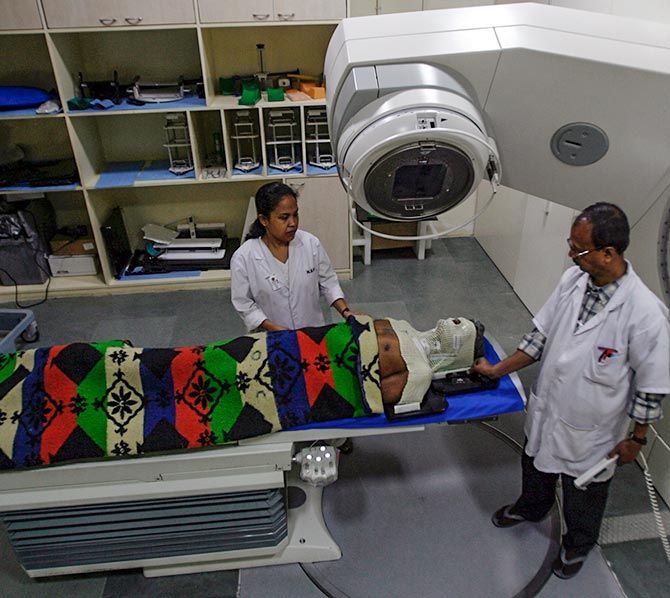Using a Living Will, individuals can specify that they don't want any resuscitation if death is apparent.
Using a Living Will, a person can decide s/he doesn't want ventilator or artificial breathing device, dialysis, or feeding through a tube.
Tinesh Bhasin reports.

The Supreme Court recently said people have the right to die with dignity.
It recognised patients' right to refuse treatment when there is no chance of survival by drafting a 'living will', specifying that they should not be put on life support if in coma, incapacitated or vegetative state.
While a regular Will that distributes assets is often considered the backbone of a complete estate plan, a Living Will is essential in spelling out your end of life decisions.
If at any point you are unable to communicate your wishes because you are in a coma -- or because a doctor has diagnosed you as being incapable of doing so -- a Living Will allows your family and physicians to rest assured that your personal choices are being respected.
Many terminally ill patients don't want to die at a hospital with their bodies hooked to machines in an ICU.
Using a Living Will, individuals can specify that they don't want any resuscitation if the death is apparent.
Using a Living Will, a person can decide s/he doesn't want ventilator or artificial breathing device, dialysis, or feeding through a tube.
Just like a regular Will, a person making a Living Will needs to be in a healthy and sound mind, and capable of conveying his decisions clearly.
The Living Will should be made voluntarily.
It should not be forced or made under the influence of someone else.
When writing the Living Will, the individual needs to mention that s/he understands the consequences of her.his decisions.
Then, s/he needs to specify the circumstances under which s/he would like the life support to be withdrawn.
To ensure that your choices are followed correctly, you will also need to appoint a person who understands what you would have wanted and take a decision on your behalf when you cannot.
It means you will want to have a frank discussion with this person before you choose her/him.
You need to check if s/he is comfortable with your decisions; if her/his religion's beliefs allow him to carry out your wishes; and so on.
You can choose more than one person to carry out your wishes.
A Living Will is a legal document just like a regular Will.
An individual, therefore, needs two witnesses to sign the document.
It also needs to be countersigned by a first class judicial magistrate. It is to confirm that the Will is made voluntarily.
The judicial magistrate will keep a copy of the Will and forward another copy to the registry of the district court.
If the person writing the Living Will becomes terminally ill and the Will has to be put in force, the doctor treating the patient need to check with the judicial magistrate if the Will submitted is authentic or not.
Only after confirmation can the doctor proceed with the withdrawal of life support.
A Living Will can also be updated like a regular Will. You may need to do it after your circumstances change.
You may have appointed your spouse to carry out your wishes, for example, but you are now divorced. Legal experts say it is best to make a new Living Will and follow the entire procedure.
Procedure for making A Living Will:
- Any adult of sound mind and capable of communicating her/his decision clearly can make it.
- It should be in writing and must categorically state if the treatment needs to be withdrawn or provided.
- Appoint a guardian or a relative to decide on your behalf.
- Sign the will in the presence of two witnesses, and it should be countersigned by a first class judicial Mmagistrate.
- Execution can only happen after the medical board grants permission.
Source: Lawrato.com
Kindly note: The lead image has been published only for representational purposes. Photograph: Rupak De Chaudhuri/Reuters











